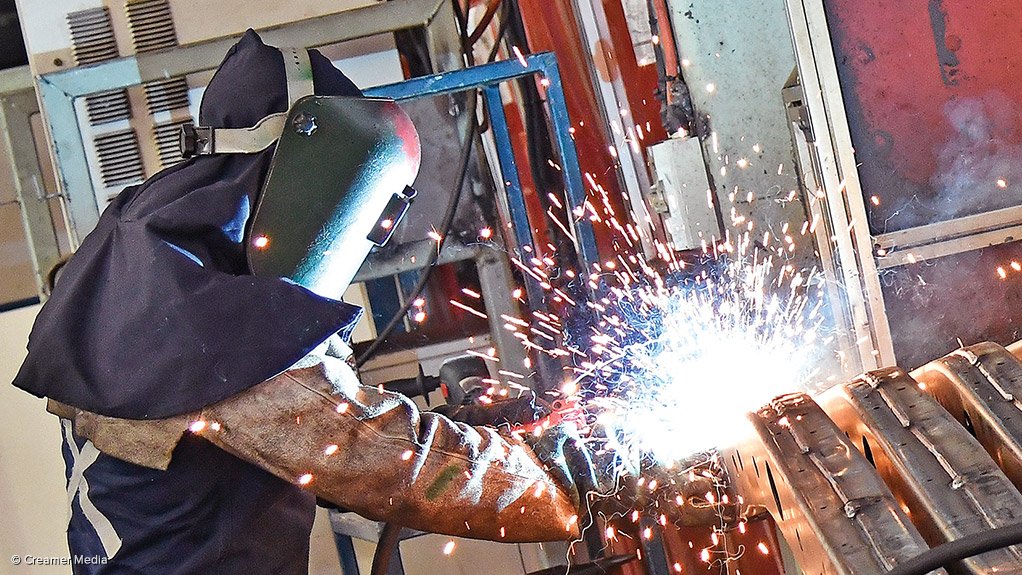Seifsa gives artisans in training detailed STEMi career insights
The demand for technical skills is growing and jobs in skilled trades and technical vocations are providing some of the best job security and resilience in the face of the profound changes shaping the world, said industry organisation the Steel and Engineering Industries Federation of Southern Africa (Seifsa) human capital and skills development adviser Mabandla Nhlapo.
The world is seeing a profound shift in its economies and societies, and science, technology, engineering, mathematics and innovation (STEMi) are opening new possibilities for the youth and the future of the nation, he said during a career day at the Seifsa training centre in Benoni, Ekurhuleni, on June 27.
With forecasts that 1.7-billion blue collar jobs will be created worldwide by 2032, skilled people are in high demand, which is driving higher salaries and earnings. There are also opportunities for entrepreneurship and global mobility in the industry, as well as opportunities for further skills and career development.
This was his message to the artisans in training at the centre, who received a detailed look at each of the STEMi components from professionals, scientists and engineers.
Technical skills and talent solutions company Mapitje MD Meta Tladi told the young artisans that all communities have curious young people who should be supported and nurtured to go into STEMi careers.
Young people were told that mathematics was difficult, but this was not true and South Africa must nurture an appreciation for technical disciplines to empower its young people to explore, experiment and develop careers and businesses, she said.
“Any company will be obsolete if we try to do things the same way we did 20 years ago. This is why we need more curious young people entering our industries and economy to change things to make them more appealing in today's economy.
“Further, technological innovations, such as artificial intelligence, are changing a host of established careers, including lawyers and human resource managers, but AI will not displace the skills needed in this industry,” she told the more than 100 young artisans.
Meanwhile, South African Nuclear Energy Corporation radiation protection specialist and nuclear physicist Zamazizi Dlamini gave the artisans in training an overview of the role of science in society, namely that it is the foundation for discovery and innovation.
“Science can provide the tools we need to solve our problems, such as climate change and pollution. Similarly, behind each innovation, such as smartphones and solar panels, are teams of scientists who undertook the research to create the technologies.
“Our country needs to invest in science and research to create industries and solutions for the future. Science builds knowledge and helps us to make sense of how the world works and how we can fix and protect it,” she emphasised.
Stanford University Applied Fluids and Thermal Engineering Research Laboratory researcher, computer scientist and civil engineering PhD student Angelica Stewart, in a video presentation from the US, told the artisans in training that technology was about developing impactful tools for daily life and industries.
“An example is the Mars rover, which is a tool to explore another planet, and which required a host of technologies to create, including mechanical engineering innovations and a lot of programming.
“Technologies are also not [always] physical, such as AI, which is not physical like a wheel or a Mars rover, but is instead used as an automating intelligence.
“Technology is about making our lives better and tackling problems such as air pollution, climate change, energy and health,” she said.
Further, engineering was about leveraging technologies as part of a broader design to solve problems, including how best to apply technologies and how they should be maintained, Howard University atmospheric sciences PhD candidate Maureen Ramaube told the artisans in training.
“We live in an engineered world. Engineers design, repair, optimise and keep things working. We are a developing country and we need the innovation that springs from engineering.”
Additionally, in a separate presentation, steel manufacturer, merchandiser and distributor Macsteel steel development manager Tammy van Niekerk added that, once the artisans' apprenticeships end, they could study further to become an engineer or start a business of their own.
“The end of your apprenticeships is not the end of the road, but the first step on the road. The Burj Khalifa, in Dubai, in the United Arab Emirates, and the Nelson Mandela bridge, in Johannesburg, were both designed by people who started out as artisans and then studied further to become engineers.
“The world needs your skills,” she told the artisans.
Additionally, North-West University mathematics and informatics professor Tanya Verster gave the artisans some insights into how mathematics is used in a range of industries, including for financial lending, fraud detection and prevention, statistics, predictive modelling in commercial sectors and preventative maintenance in industrial sectors, among others.
Meanwhile, innovation is about nurturing creativity, exploring and looking for the next challenge to solve, said reclamation, recovery and recycling company Plus27 Concepts founder and director Mduduzi Malatsi.
“One of the best ways we can promote innovation is recognising that failure is not the opposite of success, but an integral part of success. Innovation is difficult, and you will start a project that will fail; it is difficult, but not impossible.
“Youth need to embrace the concept of failure as part of success in order to challenge norms. Innovation is about developing new processes and technologies, improving existing processes and technologies, and about solving problems that people did not even know they had,” he said.
Additionally, industrial software and instrumentation company Control Systems Integration (CSI) MD Dries van Schalkwyk said South Africa only had about 42 registered electricians and electronics technicians per one-million people in the country.
“Therefore, we are about 50-times to 80-times behind the likes of the US, with about 2 300 electricians per million people, Canada with 3 500 registered electricians per million people and the UK with 3 000 electricians per one-million people.
“We need technical skills. We have a skills shortage. CSI automates factories and mines and we need instrument technicians because there is a scarcity.
“Additionally, while we provide apprenticeship placements in partnership with [skills development company] Thuthukisa, more companies should take in artisans and give them workplace experience under the leadership of experienced professionals in the industry,” he said.
However, artisans should continue to develop their skills throughout their careers because South Africa must develop its people's skills to survive and grow, he added.
As part of the career day, the artisans in training also received advice on career development and entrepreneurship.
Van Niekerk advised artisans to look for apprenticeship placements between December and February, noting that she would have filled her company's allotment during this period.
At a series of booths outside the venue, the artisans in training interacted with entrepreneurs from startup companies and companies undergoing business incubation to get an understanding of the opportunities in the technical sectors and how to secure support for career development and establishing companies.
Article Enquiry
Email Article
Save Article
Feedback
To advertise email advertising@creamermedia.co.za or click here
Press Office
Announcements
What's On
Subscribe to improve your user experience...
Option 1 (equivalent of R125 a month):
Receive a weekly copy of Creamer Media's Engineering News & Mining Weekly magazine
(print copy for those in South Africa and e-magazine for those outside of South Africa)
Receive daily email newsletters
Access to full search results
Access archive of magazine back copies
Access to Projects in Progress
Access to ONE Research Report of your choice in PDF format
Option 2 (equivalent of R375 a month):
All benefits from Option 1
PLUS
Access to Creamer Media's Research Channel Africa for ALL Research Reports, in PDF format, on various industrial and mining sectors
including Electricity; Water; Energy Transition; Hydrogen; Roads, Rail and Ports; Coal; Gold; Platinum; Battery Metals; etc.
Already a subscriber?
Forgotten your password?
Receive weekly copy of Creamer Media's Engineering News & Mining Weekly magazine (print copy for those in South Africa and e-magazine for those outside of South Africa)
➕
Recieve daily email newsletters
➕
Access to full search results
➕
Access archive of magazine back copies
➕
Access to Projects in Progress
➕
Access to ONE Research Report of your choice in PDF format
RESEARCH CHANNEL AFRICA
R4500 (equivalent of R375 a month)
SUBSCRIBEAll benefits from Option 1
➕
Access to Creamer Media's Research Channel Africa for ALL Research Reports on various industrial and mining sectors, in PDF format, including on:
Electricity
➕
Water
➕
Energy Transition
➕
Hydrogen
➕
Roads, Rail and Ports
➕
Coal
➕
Gold
➕
Platinum
➕
Battery Metals
➕
etc.
Receive all benefits from Option 1 or Option 2 delivered to numerous people at your company
➕
Multiple User names and Passwords for simultaneous log-ins
➕
Intranet integration access to all in your organisation




















